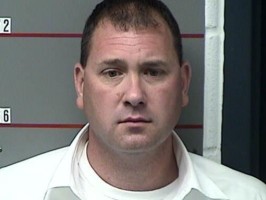
Capt. Mike Fitzhugh will serve as interim sheriff of Rutherford County.
U.S. District Judge Kevin Sharp must be worn out from dealing with Rutherford County. After handling former Sheriff Robert Arnold’s hijinks on the heels of the lawsuit against PCC dealing with probation services, Sharp is hanging up his robe.
The chief justice of the Middle District of Tennessee is set to leave the bench—and a lifetime appointment—in April to go back into private practice, according to reports.
Sharp will be missed by those who like a quick wit and dose of judicial honesty, along with some colorful prose.
For instance, during a bond revocation hearing last year for Arnold, the judge and former sheriff’s defense attorney discussed a point about Arnold’s testimony, with the attorney noting the matter went to “credibility.”
Sharp responded, saying something like, “I’ve got a pretty good idea about his credibility.” Which left court attendees wondering, “Why the heck do we have to come back after lunch break?”
The judge’s subsequent written order left no doubt about what he thought of Arnold’s performance on the stand as the detained sheriff tried to talk his way out of a Kentucky county jail where he was sent in late September for violating his bond. He’s likely to stay there until May, when he’ll be sentenced on a conviction for wire fraud, honest services fraud and extortion in connection with a scheme to benefit from an e-cigarette company run by his uncle and former Chief Administrative Deputy Joe Russell at the county jail.
Background aside, Sharp used some interesting language to cast doubt on Arnold in ordering he continue to be held in jail.
“The breadth of Defendant’s prevarication while on the stand is difficult to capture in written words. Time and again he was confronted with inculpating evidence but, true to form, he offered excuses or explanations that were incredible and oftentimes inconsistent with his other testimony,” Sharp wrote. “Even his plea to the Court to release him and his assertion through tears, real or manufactured, that he would comply with whatever conditions were imposed was not believable.”
Sharp found Magistrate Alistair Newbern followed the law when she initially ordered Arnold’s bond revoked because of a domestic assault incident between him and his wife after he’d been drinking heavily and took a sleeping pill on Labor Day. Newbern also found Arnold tampered with witnesses by telling his wife not to talk to TBI agents and by calling deputies to their home to “mess with Megan” the night of the incident. Arnold claimed he didn’t remember wrestling with Megan because he was wasted.
As a result, Sharp wrote, “The supposed lack of recollection aside, Defendant was simply not a credible or believable witness. He testified that he ‘embellishes’ things sometimes, an understatement if ever there were one given that he admitted in open court to fudging the truth during statistical presentations to the County Commission. Not only that, the evidence shows that Defendant is manipulative and deceptive.”
Arnold “wove” an “incredible story” for his wife about the Grayson County, Ky., jail colonel telling him gang members put a hit out on his life and could earn a teardrop tattoo in jail by putting a shank in his neck.
“This was not only farcical, it was manipulative in the sense that he was trying to invoke sympathy or get a reaction,” the judge wrote.
Arnold’s deception continued to work against him after he was convicted in mid-January as he asked for permission to be released to live with his mother in Brentwood, instead of his family, until the May sentencing. Sharp rejected that request as well.
Truth be told, though, Sharp didn’t have to sit through one or two weeks of trial; he only had to listen to a bunch of silliness during one court hearing. So he’s probably not physically tired, just irritated with the idea of a county sheriff using a company he helped start to make some extra jack on the backs of inmates and taxpayers.
In the first hearing on this whole shebang last year, Russell’s attorney, Jodie Bell, told Sharp she needed more time and help to prepare for this “complex” case. Sharp responded by saying, “Is it really that complex?”
As it turned out, it wasn’t.
Who Needs Enemies?
There were once a couple of good ol’ boys, cousins in fact, who got in trouble with the law for selling drugs. As they were getting ready to go to court, prosecutors told one of them he could get a better deal if he ratted on his cousin. It didn’t take long for him to spill his guts.
After cooperating and copping the plea, the tattler was greatly relieved when the guy who took the fall told him, “Don’t worry, if they’d come to me first, I’da done the same thing.”
That’s apparently what happened with Joe Russell and Robert Arnold.
Arnold is expected to get anywhere from five to six years after entering his guilty plea, based on the sentencing guidelines. They’re both being required to make restitution of $52,500, the amount of money they are said to have taken in JailCigs commissions rather than giving the money to Rutherford County.
Russell, who pleaded guilty to the same offenses, is expected to get much less time. His petition to plead guilty states, “My attorneys estimate my advisory sentence guideline range is 46–57 months, prior to any potential reduction for substantial assistance pursuant to U.S.S.G. section 5K1.1.”
Judge Sharp told Russell he couldn’t guarantee him anything on his plea.
Yet his plea agreement, which was sealed under a court order, was different than Arnold’s. Prosecutors said when Arnold, Russell and John Vanderveer came up with the plan for JailCigs in mid-2013, they discussed giving Rutherford County a cut of the money, $5 per e-cig.
But Arnold got mad at Rutherford County commissioners about budget matters and decided to cut the county’s commission to $2 and then decided to keep all the money himself “out of spite.” He also needed the money for his 2016 re-election, according to prosecutors.
After their JailCigs scheme came to light, Arnold and Russell also discussed throwing away a thumb drive with JailCigs information on it and other documents, but the thumb drive didn’t make it to the trash can, according to the prosecution.
It’s hard to believe anyone would have known that stuff except Russell and Arnold.
But if you’re looking at prison time, friendship doesn’t really mean much. After all, there is no honor among thieves.
New Kid in Town
After a great deal of heartache, Rutherford County Commissioners selected former Capt. Mike Fitzhugh as interim sheriff to reshape the damaged sheriff’s office and recertify the jail.
He appears to making some headway, bringing in Bernard Salandy from the workhouse to put the detention center in shape and getting rid of Arnold cronies, some of whom were shipped out by Deputy Chief Keith Lowery.
Fitzhugh got the nod in an 11–10 vote over TBI Agent Dale Armour, a former sheriff’s candidate. They both made strong presentations to the commission two nights before the final decision.
A lot of people were shocked by the outcome, figuring it would be either Armour, Lowery or former Deputy Chief Virgil Gammon, who served for decades under former Sheriff Truman Jones and under Arnold.
But the fact that Gammon was the main whistleblower on the JailCigs scheme apparently didn’t register with many of the commissioners. Several seemed more upset that he sued the county—and received a $350,000 settlement—after being fired by Arnold.
While Gammon contended he needed to file the lawsuit to let people know what happened in the JailCigs situation, he told commissioners at least twice, “It was never about the money.”
Maybe it wasn’t, but county commissioners don’t like getting sued, and they don’t like doling out cash. They also were inundated with behind-the-scenes calls from people trashing Gammon.
This is not to say Gammon wouldn’t make a good sheriff. But commissioners apparently didn’t want to hire anyone connected to Arnold, even someone who turned him over to the feds.
Fitzhugh, meanwhile, was extremely professional in his presentation, and he had left the sheriff’s office instead of putting up with Arnold’s B.S. and spending the next four or five years trying to defend him.
In addition, he said he was concerned with returning the sheriff’s office to good standing and keeping it off the front pages and the 6 o’clock news, except for good work, of course. While that philosophy is bad news for reporters, it’s the right strategy to take.
The thing that’s always been so confusing about the sheriff’s office is that it’s such a political hot potato, a kingdom of sorts with the head honcho always putting out or starting fires. Ultimately, people want the chief law enforcement officer of Rutherford County to be a strong leader who executes the duties of the sheriff. That doesn’t include making money on a side business. And it doesn’t include throwing out your best people because they disagree with your immature policies, costing Rutherford County hundreds of thousands of dollars in legal settlements.
What a long, strange trip it’s been.
















